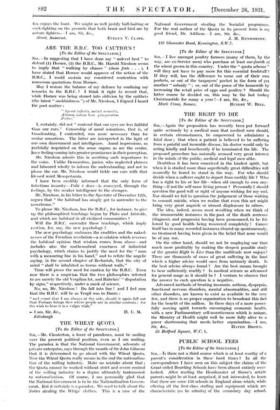THE RIGHT TO DIE
[To the Editor of the SPECTATOR.]
Srn,—Again the proposition has recently been put forward quite seriously by a medical man that medical men should, in certain circumstances, be empowered to administer a fatal dose ; that when a patient is believed to be suffering from a painful and incurable disease, his doctor would only be acting kindly and beneficently if he terminated the life. The proposed procedure has naturally aroused very great interest in the minds of the public, medical and legal men alike.
Doubtless it has been conceived in the kindest spirit, but when it is studied more than superficially great difficulties will assuredly be found to stand in the way. For who should decide when a sufferer ought to depart from earthly life ? Who has a right to his or her life—when old enough to own any- thing—if not the self-same living person ? Personally I should question the good will or right of anyone wishing for my end. Nor should we fail to question the judgement of those wishing to commit suicide, when we realize that even this act might bring very great anguish or utmost displeasure to others.
The idea, indeed, seems most revolting when we think of the innumerable instances in the past of the death sentence (diagnosis and prognosis) having been pronounced, to be fol- lowed by good health being recovered completely ! Cancer itself has in many recorded instances cleared up spontaneously, no treatment having been given in the belief that none would be of any use.
On the other hand, should we not be employing our time much more profitably by making the deepest possible study of the greater Right to Live than the multitude now enjoys ? There are thousands of cases of great suffering in the land which a higher advice would save from untimely death. Is the best advice always found ? Are the best means brought to bear sufficiently readily ? Is medical science as advanced for general usage as it should be ? I venture to observe that the answer to each question is a negative.
Advanced methods of treating insomnia, asthma, dyspepsia, functional nervous disorders, mental abnormalities, and still other disorders, are known to exist as available to the very few, and there is no proper organization to broadcast this fact for the benefit of the million. In these days of a more power- fully moving spirit towards encouraging economic health, with a new Parliamentary self-assertiveness which is unique, the Ministry of Health might well be more fully alive to a grave shortcoming that needs better organization.—I am,
Sir, &c., HAYDN BROWN. 53 Bedford Square, W.C. 1.
































 Previous page
Previous page